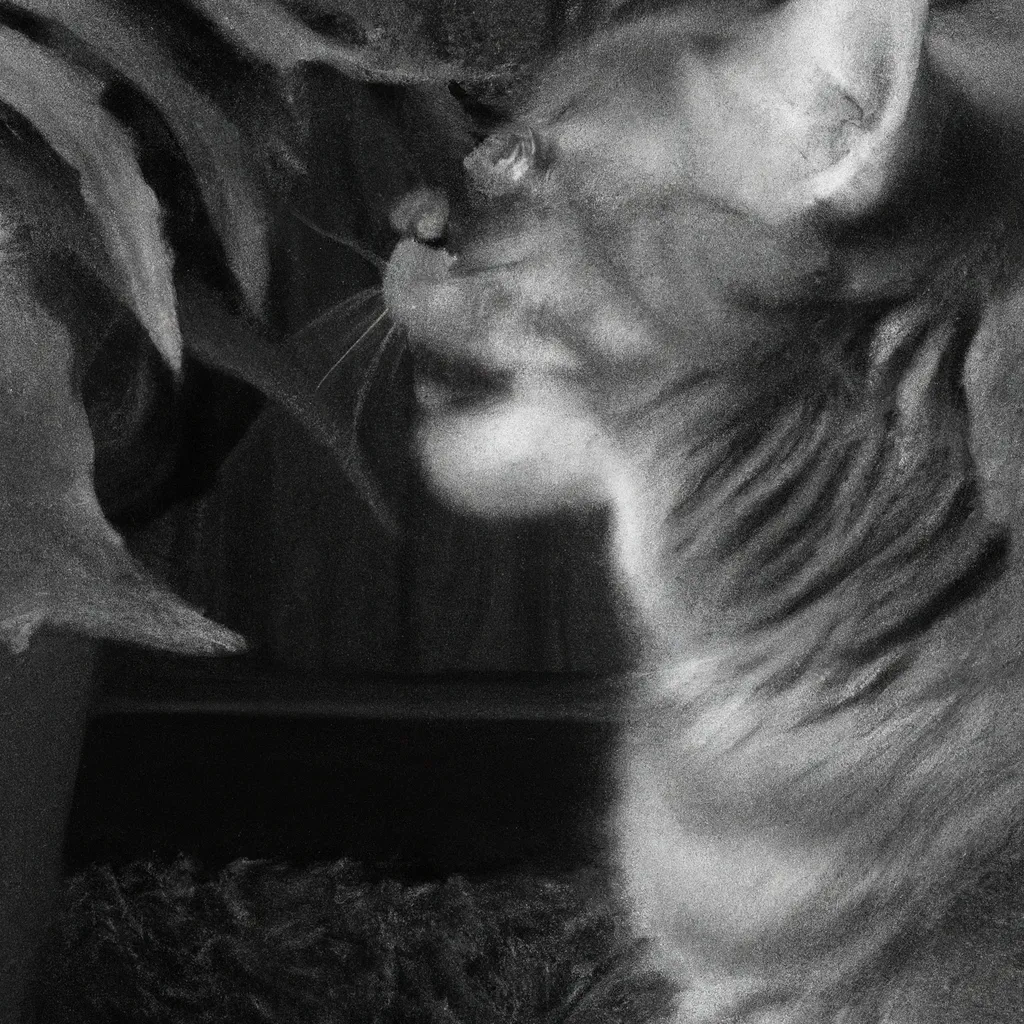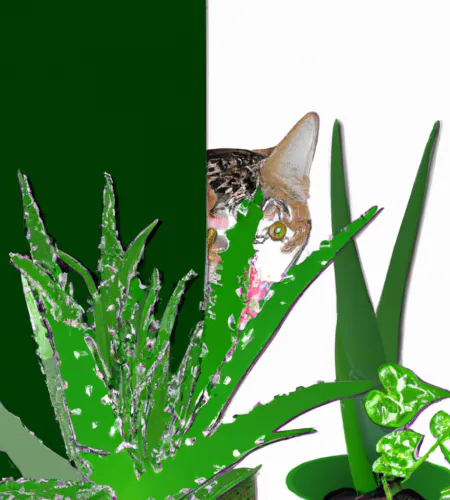Unravel the verdant mysteries of the feline world as we dig deep into the question – “Can cats eat plants?” Just as a cat’s curiosity is boundless, so too should be our understanding of their dietary needs and restrictions. As feline aficionados, we are well aware that cats are obligate carnivores, meaning their primary food source is meat. However, anyone who has ever caught their whiskered companion nibbling on a houseplant knows that cats often have a penchant for greens. But, is this leafy indulgence safe?
Many cat owners find themselves in a botanical conundrum, questioning the safety of their green-thumbed love in the presence of their feline friends. This article aims to shed light on the symbiotic or potentially toxic relationship between cats and plants. We will delve into the emerald enigma, exploring the symptoms of plant poisoning in cats, the amount of plant material that could be considered toxic, and the necessary steps to take if your cat has ingested a potentially harmful plant.
Moreover, we will venture into the captivating world of cats’ preferences, discussing whether our feline friends actually enjoy plants or if their interest is purely driven by curiosity or instinct. We will also examine the potential health benefits, if any, that plants may offer to cats, and explore safe, botanical alternatives to satisfy their leafy cravings. Lastly, we’ll return to their carnivorous roots and discuss the best food options for our beloved feline companions.
Whether you’re a seasoned cat parent or a novice in the world of feline care, this comprehensive guide will provide invaluable insights into your cat’s dietary needs and safety. So, let’s embark on this enlightening journey, understanding the complex relationship between cats and plants, and ensuring our feline friends lead a healthy, happy, and safe life.
Is plants Bad for Cats?
Indeed, certain plants can be harmful to cats, posing a risk to their health. Felines, despite their carnivorous nature, occasionally nibble on plants for various reasons such as aiding digestion or combating hairballs. However, not all plants are safe for cat consumption. Many common household plants like lilies, azaleas, and oleander are toxic to cats, potentially causing symptoms ranging from mild irritation to severe organ damage. Therefore, it’s crucial for cat owners to be mindful of their plant choices, ensuring they are non-toxic and safe for their feline friends. Always consult a vet or a trusted source before introducing a new plant into a cat-friendly environment. It’s better to err on the side of caution and prioritize your pet’s wellbeing. Remember, when it comes to cats and plants, safety first!
Why is plants bad for cats?
Contrary to the common perception, not all plants are safe for cats to consume. The feline digestive system is inherently carnivorous, making it ill-equipped to process plant material, which can result in gastrointestinal upset. More alarmingly, certain plants are outright toxic to cats, including lilies, azaleas, and tulips, among others. These plants contain compounds that can trigger a range of harmful reactions, from mild irritation to severe organ damage, making them a perilous addition to a cat’s diet.
What are the symptoms of plants Poisoning in Cats?
Recognizing the signs of plant poisoning in cats is crucial for timely intervention. Symptoms can vary based on the type of plant ingested, but common indications include vomiting, diarrhea, drooling, loss of appetite, and lethargy. In more severe cases, cats may exhibit difficulty breathing, changes in heart rate, dilated pupils, or even seizures. If your feline companion exhibits any of these signs after consuming a plant, it is imperative to seek veterinary assistance immediately. Timely treatment can significantly improve the prognosis and help your pet recover from this potentially life-threatening situation.
How much plants is toxic to cats?
Quite a significant number of plants, approximately 700 species, can be toxic to cats, posing a potential risk to their health. These harmful plants range from common household greenery like lilies and azaleas to outdoor plants such as rhododendrons and foxgloves. Each plant’s toxicity level varies, causing symptoms from mild irritation to severe health issues, including kidney failure or even death. It’s crucial for cat owners to be knowledgeable about these plants, ensuring a safe environment for their feline companions. Before introducing any new plant into your cat’s space, always check its safety to prevent any unfortunate incidents.
Can Cats Die From plants?
Yes, cats can indeed die from consuming certain plants. Our feline friends are often intrigued by the greenery in their environment, but unfortunately, many common household plants are toxic to them. Consuming these plants can lead to a range of symptoms, from mild irritation to severe organ damage, and in extreme cases, it can even be fatal. Plants such as lilies, oleander, and sago palm are particularly harmful to cats. Therefore, it’s crucial for cat owners to be knowledgeable about the types of plants they have in their home and garden, and to ensure their beloved pets are kept safe from potential plant hazards. Remember, while cats may be carnivorous by nature, their curiosity can lead them to nibble on things that aren’t part of their usual diet, including dangerous plants.

What to do if cat ate plants? How to help?
Firstly, if your feline friend has indulged in some greenery, don’t panic. Cats are often attracted to plants, but not all flora is feline-friendly. Identify the plant consumed, as some are toxic to cats. If it’s a harmful variety, contact your vet immediately.
While waiting for professional help, prevent further ingestion and keep your cat calm. Monitor for symptoms like vomiting, diarrhea, drooling, or changes in behavior. These could indicate plant poisoning.
Remember, prevention is the best cure. Keep toxic plants out of your cat’s reach or, better yet, opt for cat-friendly plants. Educating yourself about toxic and non-toxic plants can help you create a safer environment for your cat.
Ultimately, your quick response and keen observation can make a significant difference in your cat’s wellbeing should they consume a harmful plant. Always consult with a veterinarian if you’re unsure about your cat’s health.
What will a vet do if a cat is poisoned by plants?
In the unfortunate event that a cat is poisoned by plants, a veterinarian will promptly embark on a comprehensive course of action. This typically includes immediate stabilization of the cat’s condition, followed by diagnostic tests such as blood work and urinalysis to confirm the presence of toxins. The treatment plan may involve inducing vomiting, administering activated charcoal to absorb the toxins, and providing supportive care such as intravenous fluids and oxygen therapy. The vet may also administer specific antidotes if available and monitor the cat’s progress closely until it is out of danger.
Do cats like plants?
While cats are known for their natural curiosity and may show interest in plants, it’s important to note that not all plants are safe for our feline friends. Cats may be attracted to plants due to their movement, texture, or simply the novelty of a new addition to their environment. However, many common household plants are toxic to cats, including lilies, azaleas, and poinsettias. Consequently, it is vital for cat owners to be aware of the plants they have in their home and garden, and ensure they are safe for their feline companions. Always consult with a vet or a reliable source before introducing a new plant into a cat-friendly space.
Is plants good (healthy) for cats?
As a cat connoisseur, I can affirm that not all plants are beneficial for our feline friends. While some plants can offer cats a playful distraction or even some dietary benefits, others can be harmful or even fatal. It’s a feline fact that cats are obligate carnivores, meaning they require a diet primarily of meat. While they occasionally enjoy nibbling on greenery, it’s essential to ensure that the plants they ingest are non-toxic. Cats are naturally curious creatures, so it’s our responsibility to keep their environment safe, including the plants they may encounter.
Can cats eat air plants?
Now, let’s talk about air plants, a popular choice for indoor greenery. These little wonders of nature are not only beautiful but also easy to care for, making them a favorite among plant lovers. But the question remains: can cats eat air plants? The answer is yes, cats can technically eat air plants without experiencing toxicity. However, as with any non-food item, ingestion could potentially lead to gastrointestinal upset or blockages. Therefore, while air plants aren’t poisonous to cats, it’s still advisable to keep them out of your cat’s reach. Remember, the key to a cat’s heart is through its stomach, but that doesn’t mean everything should be on the menu!
Are there safe alternatives to plants for cats?
Indeed, there are safe alternatives to plants for cats that can satiate their natural urge to nibble on greenery without posing any risk to their health. Cat grass, such as wheatgrass or oat grass, is a fantastic substitute that not only provides a safe outlet for their grazing instincts but also aids in their digestion and provides them with essential nutrients. Additionally, catnip is another safe plant alternative that can provide your feline friend with a burst of energy and excitement. However, it’s crucial to remember that while these are safe, they should not replace the primary diet of your cat but rather serve as a supplement or treat.
What is the best food for cats?
When it comes to the best food for cats, a balanced diet rich in high-quality proteins is the gold standard. Cats are obligate carnivores, meaning they require a diet predominantly of meat. Look for foods that list a source of animal protein, like chicken, fish, or beef, as the first ingredient. Additionally, a mix of wet and dry food can provide a variety in texture while ensuring they receive adequate hydration and dental health benefits. However, each cat is unique, and their dietary needs can vary based on age, health status, and lifestyle. Therefore, it’s always best to consult with a vet to tailor a diet that meets your cat’s specific nutritional needs. Remember, treats and supplements, including safe plant alternatives, should only make up a small portion of their overall diet.
Subscribe to our email newsletter to get the latest posts delivered right to your email.

